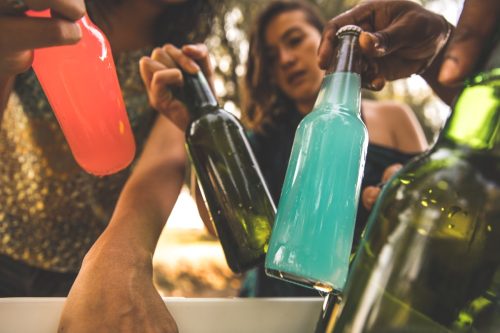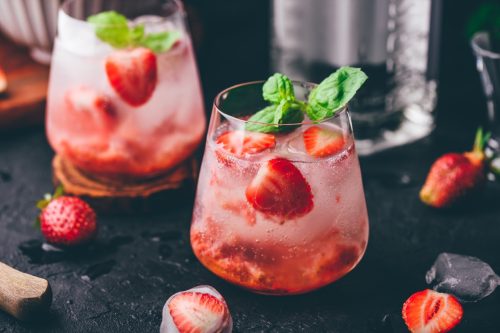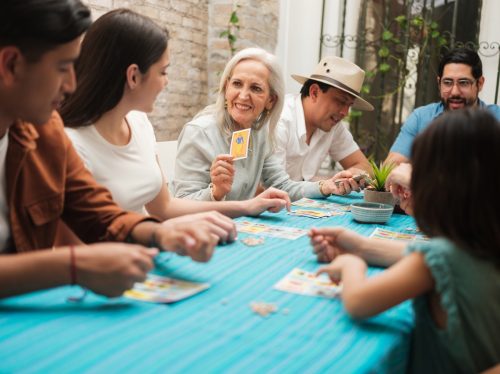5 Hosting Tips for Guests Who Don't Drink, Etiquette Experts Say
It's important to make sure sober friends feel comfortable and have a great time.

There are plenty of factors to consider when planning a party, from who you're going to invite to what you're going to serve. But when it comes to the drink selection, it's important to remember that there are plenty of people who, for one reason or another, don't drink alcohol. Because many of our gatherings involve wine, beer, or liquor, attendees who don't imbibe are often an afterthought. If you want to be a better host, there are certain changes you can make so that everyone feels equally included. Read on for five hosting tips for sober guests, according to etiquette experts.
RELATED: The 6 Best Things to Ask Guests to Bring—If They Offer.
1
Don't make a big deal about what people are or aren't drinking.

Shining a spotlight on sober guests is one of the worst things you can do as a host. Instead, it's your job to make sure all your guests feel comfortable and not singled out, according to Jodi Smith, nationally-known etiquette consultant and founder of Mannersmith.
"There are many, many reasons why someone may not be drinking alcohol," she notes. "They may be in recovery, alcoholism may be an issue in their family, they may be pregnant, they may observe a religion where alcohol is forbidden. Maybe they are taking medication that interacts poorly with alcohol, or they have a big day tomorrow."
As a result, it's important to recognize that your guests should never feel obligated to explain why they aren't drinking.
"Savvy hosts also know not to make a big deal about what people are drinking. The focus should be on the guests, not what is in their cups," Smith says. "Remember, everyone drinks. But not all guests drink alcohol."
RELATED: 6 Things You Should Put Away When Guests Come Over, Experts Say.
2
Be considerate with how you're communicating.

While it's important not to harp on the fact that there are guests present who aren't drinking alcohol, you should still be mindful in your conversations.
"Make sure everyone feels included and respected when it comes to conversations about drinking," Ryan Hetrick, therapist, psychologist, and CEO of Epiphany Wellness, advises.
If you have a mix of guests who drink and those who don't, Hetrick says you should steer away from talking about alcohol, including any jokes or lighthearted comments you might otherwise make.
"Be aware of potential triggers or feelings of exclusion that may come up for non-alcoholic guests. This can include avoiding phrases like 'the party won't start until we have a few drinks' or 'no one wants to hear your stories if you aren't drinking,'" he explains.
RELATED: 5 Jokes You Should Never Tell at a Dinner Party, Etiquette Experts Say.
3
Offer a lot of non-alcoholic options.

Choice is crucial for guests who don't drink. Most gatherings typically have a wide array of alcoholic options to choose from, but only one or two alternatives available for sober guests.
"Offer choice," Lisa Mirza Grotts, a 23-year certified etiquette expert, recommends. "Include a lot of different non-alcoholic options, such as soft drinks and bubbly water with lime."
If you know certain guests don't drink alcohol, you can even consider getting their input beforehand, Daniel Gospodarek, LCSW, licensed clinical social worker with Revitalize Mental Health PLLC, adds.
"Some people in recovery have their own preferences when it comes to non-alcoholic drinks," Gospodarek notes. "It may be important to inquire with them about what drinks they may want."
RELATED: 6 Items You Should Always Have in Your Kitchen When Guests Come Over.
4
Create a signature mocktail.

Having many different sodas and juices available as non-alcoholic alternatives is a great starting point, but Grotts suggests that hosts actually take it one step further.
"Create a signature mocktail," she suggests.
Many gatherings offer special cocktails for alcohol drinkers to choose from, so creating that same experience for those who don't is a "no-brainer" for being a good host, according to Grotts.
"Your guest will feel as though they're sipping a fancy drink," she says.
Adam Crookes, a culinary expert and owner of DonutMaker.io, tells Best Life that he encourages hosts to craft mocktails that "mirror the complexity and flavors" of alcohol-based cocktails.
"Experiment with fresh ingredients, muddled fruits, herbs, and garnishes to offer a unique and enjoyable experience for your non-drinking guests," Crookes advises.
For more etiquette advice delivered straight to your inbox, sign up for our daily newsletter.
5
Think about activities that don't involve drinking.

If you want to make for a more inclusive experience, plan your gathering beyond just food and beverages by focusing on entertainment.
"Consider hosting a game night, or having a casual movie night in the backyard," Hetrick says. "This will give everyone an opportunity to have fun without feeling like they need to drink alcohol in order to enjoy the event."
If that sounds like too much, you can still plan smaller activities that provide a way to entertain guests who aren't drinking, according to Adam Jones, founder of the non-alcoholic beer guide Low Beers.
"Hosts can organize engaging activities that do not revolve around alcohol consumption like trivia games, karaoke, board games, or outdoor activities," Jones says. "This ensures that sober guests can actively participate and feel included, contributing to a better overall experience for everyone."





















